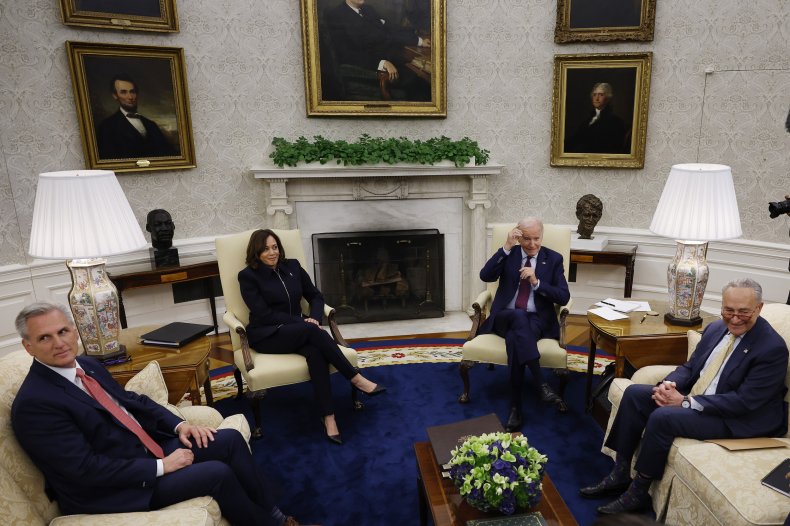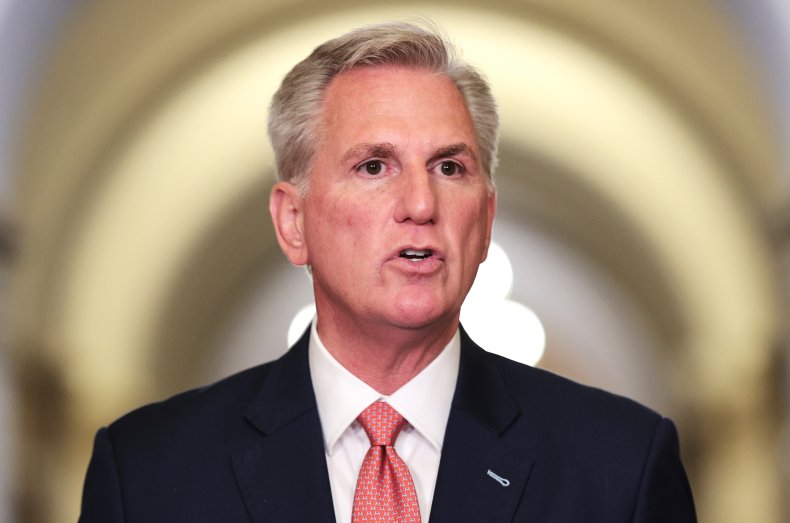Kevin McCarthy May Have To Break a Promise to Republicans Again
House Speaker Kevin McCarthy may have to break a promise he made to Republicans in order to avert a government shutdown.
The deadline of June 1, when the federal government could begin defaulting on its debts, set by Treasury Secretary Janet Yellen is only two weeks away and negotiations over the debt limit are ongoing. Although McCarthy met with President Joe Biden on Tuesday, offering hope that a deal could be reached, it typically takes the Senate a full week to process a bill.
That leaves McCarthy with less than a week to give lawmakers 72 hours to review a bill before a vote on the House floor, as he promised earlier this year.
McCarthy told reporters after Tuesday's meeting that it's "possible" there could be a deal by the end of the week, but that both sides remain "very far apart." So, if an agreement is made by Sunday, that would leave Congress with just 10 days to get the package through and give McCarthy a tight window to deliver on his three-day review promise.

The House Speaker agreed to the 72-hour provision during his fight to secure the speakership in a closely contested election. The new House rule, approved in January, was a key change that conservatives won in exchange for their votes for McCarthy.
For years, conservatives have sought to have the text of bills released days before the vote, hoping that doing so would increase transparency around the legislative process and prevent major bills from coming together in closed-door negotiations.
During this legislative session, it was anticipated that the rule would be particularly important for votes on congressional term limits, a border security plan, and the debt limit.
Gregory Koger, a political scientist at the University of Miami who specializes in American legislative bodies, told Newsweek that there are exceptions to how quickly the Senate can pass a bill—passage by unanimous consent could be less than a minute for a non-controversial bill, or sometimes for "crisis legislation."
"There is an in-between as well," Koger said. "The Senate can bring up and debate a bill under a fair unanimous consent agreement that allows members to make speeches and, perhaps, offer amendments in an expedited fashion. This would take anywhere from a few hours to a few days."
Ultimately, Koger said, it would depend on the level of cooperation among congressional lawmakers.

McCarthy has already broken the rule once when it comes to federal spending.
Last month, the House Republicans' debt package, dubbed the Limit, Save, Grow Act, never saw a committee markup before the House voted to pass the bill on April 26. But McCarthy's colleagues appeared willing to forgive the rush.
"The debt bill—it didn't go through committee but it certainly went through conference, at length," Representative Andrew Clyde, one of the holdout votes for McCarthy's speakership in January, told Politico. "As a result of that, it changed significantly. I think it changed, obviously, for the better."
Koger said while McCarthy would likely prefer to honor the 72-hour pledge, he may have to compromise on that vow "if the alternative is fiscal chaos."
Newsweek reached out to McCarthy via email for comment.
As the White House and congressional Republicans move closer to an agreement on raising the federal borrowing cap, McCarthy will be up against another time crunch.
Yellen reaffirmed her June 1 deadline to McCarthy on Monday, writing: "With additional information now available, I am writing to note that we still estimate that Treasury will likely no longer be able to satisfy all of the government's obligations if Congress has not acted to raise or suspend the debt limit by early June, and potentially as early as June 1."
In her letter to the Speaker, Yellen warned that the political brinkmanship could cause "serious harm" to businesses and consumers, raise short-term borrowing costs, and negatively impact the U.S. on a global scale.
"If Congress fails to increase the debt limit, it would cause severe hardship to American families, harm our global leadership position, and raise questions about our ability to defend or national security interests," the Treasury Secretary wrote.
Koger said that in a Congress that has struggled to pass a lot of legislation, a debt limit bill is likely to be a "magnet for every legislator's wish list."
"In order to get an agreement through Congress, leaders will have to wait until the last minute so that their members accept that most of their wishes will not be granted," he said.








